仁爱英语八年级下Unit6_topic1学案1
- 格式:doc
- 大小:108.50 KB
- 文档页数:12
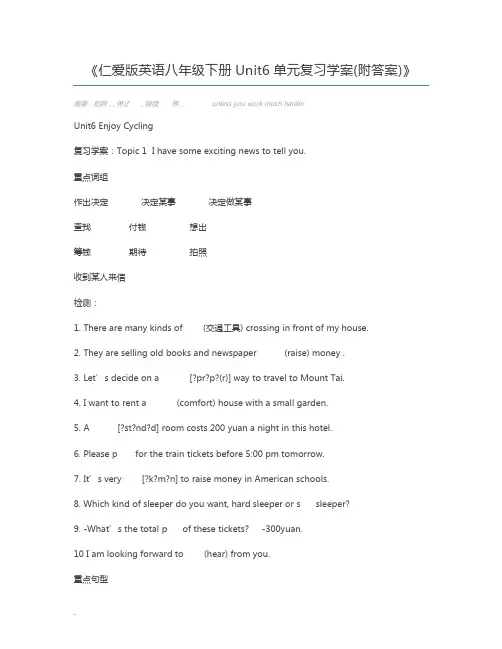
《仁爱版英语八年级下册Unit6单元复习学案(附答案)》摘要:拍照,, 停止 , 继续等., unless you work much harder.Unit6 Enjoy Cycling复习学案:Topic 1 I have some exciting news to tell you.重点词组作出决定决定某事决定做某事查找付钱想出筹钱期待拍照收到某人来信检测:1. There are many kinds of (交通工具) crossing in front of my house.2. They are selling old books and newspaper (raise) money .3. Let’s decide on a [?pr?p?(r)] way to travel to Mount Tai.4. I want to rent a (comfort) house with a small garden.5. A [?st?nd?d] room costs 200 yuan a night in this hotel.6. Please p for the train tickets before 5:00 pm tomorrow.7. It’s very [?k?m?n] to raise money in American schools.8. Which kind of sleeper do you want, hard sleeper or s sleeper?9. -What’s the total p of these tickets? -300yuan.10 I am looking forward to (hear) from you.重点句型1. I have some exciting news to tell you.我有一些令人激动的消息告诉你们。
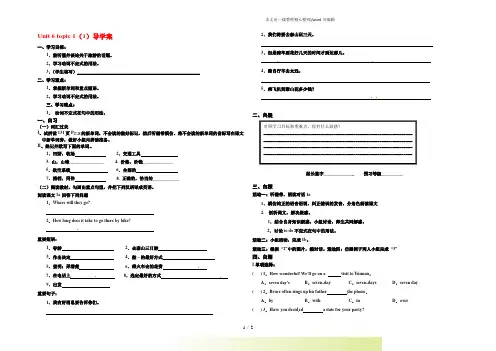
Unit 6 topic 1(1)导学案一、学习目标:1.能听懂并谈论关于旅游的话题。
2.学习动词不定式的用法。
3.(学生填写)________________________________________________________二、学习重点:1.掌握新单词和重点短语。
2.学习动词不定式的用法。
三、学习难点:1.动词不定式在句中的用法。
一、自习(一)词汇过关I、试拼读131页P27-28的新单词,不会读的做好标记,然后听磁带模仿。
将不会读的新单词的音标写在课文中新单词旁,做好小组内拼读准备。
II、熟记并默写下面的单词。
1.田野,牧场2.交通工具3. 山,山峰________________4. 价格,价钱______________5.航空系统6.全部的7.搭档,同伴8. 正确的,恰当的____________(二)阅读教材,勾画出重点句型,并把下列汉语译成英语。
阅读课文1a回答下列问题1.Where will they go?2.How long does it take to go there by bike?重要短语:1.春游2.去泰山三日游3.作出决定4.做…的最好方式5.查明;弄清楚6.乘火车去的花费7.在电话上8.选定最好的方式9.出发重要句子:1.我有好消息要告诉你们。
2.我们将要去泰山玩三天。
3.但是骑车要花好几天的时间才到达那儿。
4.骑自行车去太远。
5.乘飞机到泰山花多少钱?二、自疑组长签字______________ 预习等级__________三、自探活动一:听磁带,朗读对话1a1.模仿纯正的语音语调,纠正错误的发音,分角色朗读课文2. 剖析课文,解决疑惑。
1.结合自身知识疑惑,小组讨论,师生共同解惑。
2.讨论to do不定式在句中的用法。
活动二:小组活动,完成1b。
活动三:根据“2”中的图片,编对话。
活动四:仿照例子两人小组完成“3”四、自测I单项选择:( ) 1.How wonderful! We’ll go on a visit to Yunnan.A.seven day’s B.seven-day C.seven-days D.seven day ( ) 2.Bruce often rings up his father the phone.A.by B.with C.in D.over ( ) 3.Have you decid ed a date for your party?对照学习目标和重难点,你有什么疑惑?________________________________________________________________________________________________________________________________________________________________________________________________________________________________________________________________________________A.for B.on C.by D.in ( ) 4.—How much does the new car ____ you?—¥8,000.A.spend B.pay C.cost D.take ( ) 5.—How long does it take ____from Chongqing to Chengdu by train?A.to go B.going C.go D.went II 句型转换五、自结我学会了:____________________________________________________________________ ____________________________________________________________________ ____________________________________________________________________ ____________________________________________________________________ ____________________________________________________________________ ____________________________________________________________________ ____________________________________________________________________ ____________________________________________________________________ ____________________________________________________________________ ____________________________________________________________________。
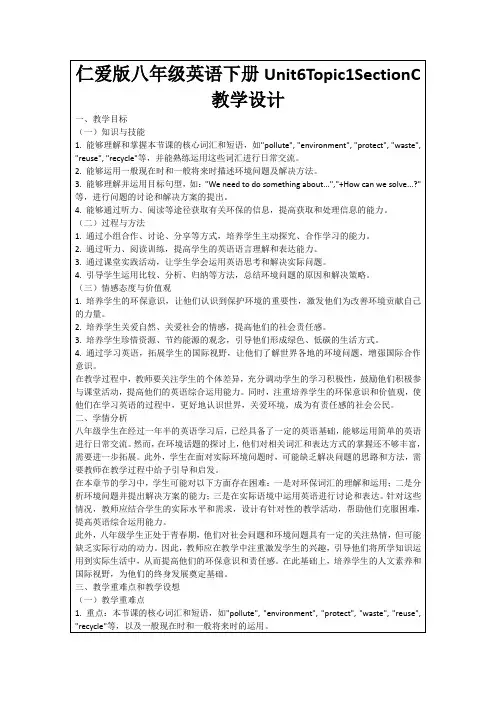
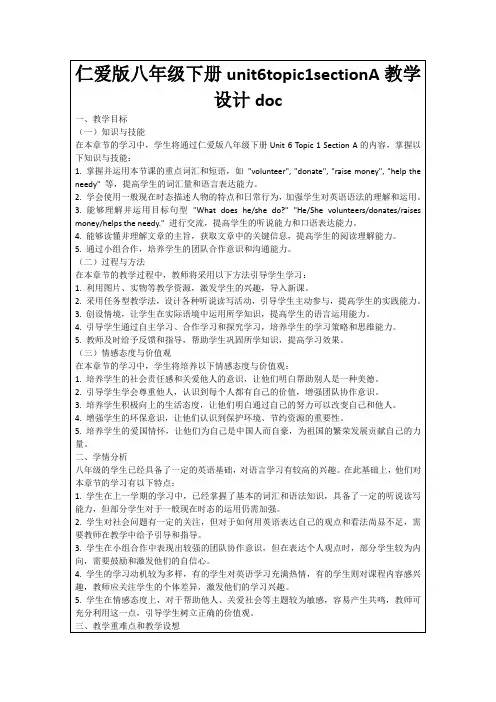
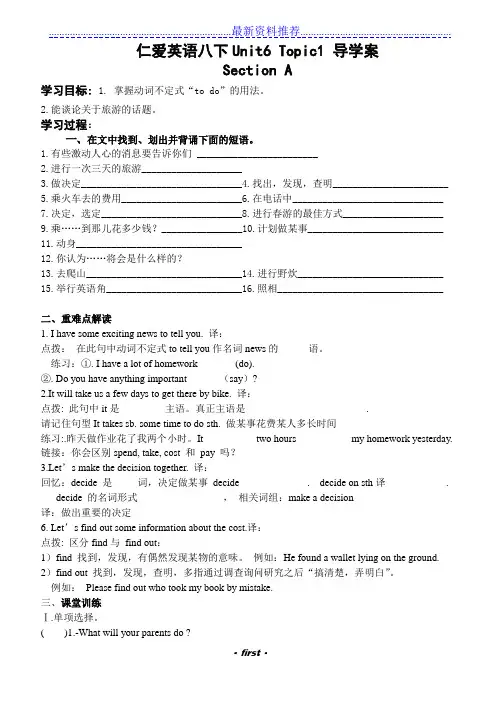
仁爱英语八下Unit6 Topic1 导学案Section A学习目标: 1. 掌握动词不定式“to do”的用法。
2.能谈论关于旅游的话题。
学习过程:一、在文中找到、划出并背诵下面的短语。
1.有些激动人心的消息要告诉你们 ________________________2.进行一次三天的旅游____________________3.做决定________________________________4.找出,发现,查明_______________________5.乘火车去的费用________________________6.在电话中______________________________7.决定,选定____________________________8.进行春游的最佳方式____________________9.乘……到那儿花多少钱?________________10.计划做某事___________________________11.动身_________________________________12.你认为……将会是什么样的?13.去爬山_______________________________14.进行野炊_____________________________ 15.举行英语角___________________________16.照相_________________________________二、重难点解读1. I have some exciting news to tell you. 译:______________________________________________ 点拨:在此句中动词不定式to tell you作名词news的______语。
练习:①. I have a lot of homework_______ (do).②. Do you have anything important ______(say)?2.It will take us a few days to get there by bike. 译:____________________________________点拨: 此句中it是_________主语。

课题:Unit6 Topic1 SectionA(第一课时)制作人:一、学习目标1、能正确、流利地拼写出本课的词汇。
2、学习动词不定式“to do”的用法。
二、学习过程(一)独立学习英汉互译(我能独立完成这个)查明_______ field ________ vehiche_______ task ________筹集_______讨论_______sunrise________飞机________决定________合计_______(二)合作探究1、It’s hard to say.2、Your task is to find out the cost by bus.3、I have some exciting news to tell you!观察以上三个句子你发现了什么?_________________________________________________________________ _____________________________________________________能总结出什么吗?_________________________________________________________________ _____________________________________________________你能举几个类似的例子?_________________________________________________________________ _____________________________________________________________________ ___________________________________________(三)回归课文学习1a。
⑴自读小组讨论1a,并翻译。
⑵听1 a,回答下列问题。
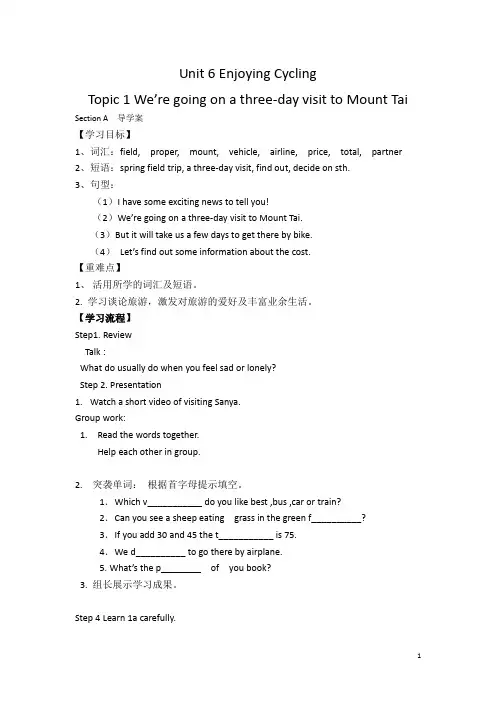
Unit 6 Enjoying CyclingTopic 1 We’re going on a three-day visit to Mount Tai Section A 导学案【学习目标】1、词汇:field, proper, mount, vehicle, airline, price, total, partner2、短语:spring field trip, a three-day visit, find out, decide on sth.3、句型:(1)I have some exciting news to tell you!(2)We’re going on a three-day visit to Mount Tai.(3)But it will take us a few days to get there by bike.(4)Let’s find out some information about the cost.【重难点】1、活用所学的词汇及短语。
2. 学习谈论旅游,激发对旅游的爱好及丰富业余生活。
【学习流程】Step1. ReviewTalk :What do usually do when you feel sad or lonely?Step 2. Presentation1.Watch a short video of visiting Sanya.Group work:1.Read the words together.Help each other in group.2. 突袭单词:根据首字母提示填空。
1.Which v___________ do you like best ,bus ,car or train?2.Can you see a sheep eating grass in the green f__________?3.If you add 30 and 45 the t___________ is 75.4.We d__________ to go there by airplane.5. What’s the p________ of you book?3. 组长展示学习成果。
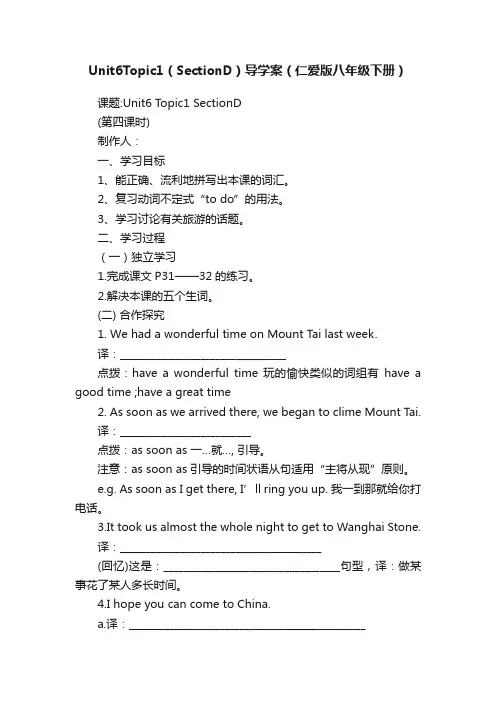
Unit6Topic1(SectionD)导学案(仁爱版八年级下册)课题:Unit6 Topic1 SectionD(第四课时)制作人:一、学习目标1、能正确、流利地拼写出本课的词汇。
2、复习动词不定式“to do”的用法。
3、学习讨论有关旅游的话题。
二、学习过程(一)独立学习1.完成课文P31——32的练习。
2.解决本课的五个生词。
(二) 合作探究1. We had a wonderful time on Mount Tai last week.译:_________________________________点拨:have a wonderful time 玩的愉快类似的词组有have a good time ;have a great time2. As soon as we arrived there, we began to clime Mount Tai.译:__________________________点拨:as soon as 一…就…, 引导。
注意:as soon as引导的时间状语从句适用“主将从现”原则。
e.g. As soon as I get there, I’ll ring you up. 我一到那就给你打电话。
3.It took us almost the whole night to get to Wanghai Stone.译:________________________________________(回忆)这是:___________________________________句型,译:做某事花了某人多长时间。
4.I hope you can come to China.a.译:_______________________________________________b.hope 动词,名词“希望”,它的用法有:________________________________________________________________ ____________________________________________________________________________________________ ____________________ (三)当堂检测(检查学生对本话题的掌握情况)词汇A) 请根据句意及首字母提示填写所缺单词。
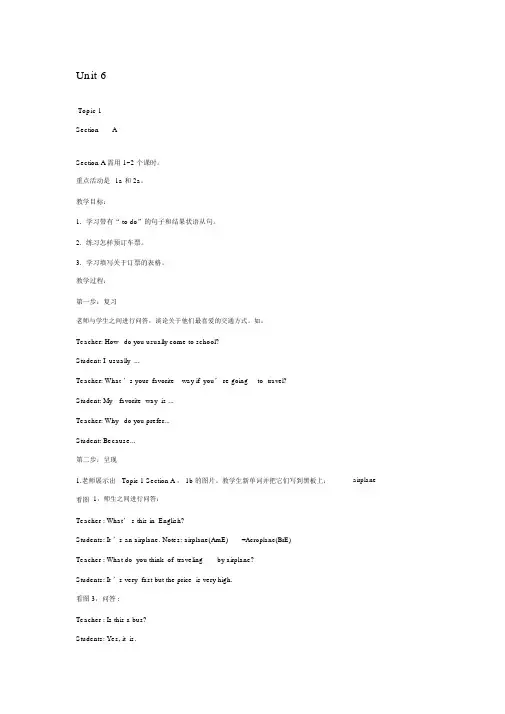
Unit 6Topic 1Section ASection A 需用 1~2 个课时。
重点活动是1a 和 2a。
教学目标:1.学习带有“ to do”的句子和结果状语从句。
2.练习怎样预订车票。
3.学习填写关于订票的表格。
教学过程:第一步:复习老师与学生之间进行问答,谈论关于他们最喜爱的交通方式。
如:Teacher: How do you usually come to school?Student: I usually ...Teacher: What ’s your favorite way if you’ re going to travel?Student: My favorite way is ...Teacher: Why do you prefer...Student: Because...第二步:呈现1.老师展示出Topic 1 Section A , 1b 的图片。
教学生新单词并把它们写到黑板上:airplane 看图1,师生之间进行问答:Teacher : What’ s this in English?Students: It ’s an airplane. Notes: airplane(AmE)=Aeroplane(BrE)Teacher : What do you think of traveling by airplane?Students: It ’s very fast but the price is very high.看图 3,问答 :Teacher : Is this a bus?Students: Yes, it is.Teacher : What do you think of traveling by bus?Students: It takes too long.2. 将下面的句子写到黑板上,让学生注意生词:field,vehicle, group, task① We’ re going on a spring field trip.② It’ s too far for cycling,but there are other vehicles for us to choose.③Let’s work in groups to find out the information about the costs.④ Kangkang and Michael, your group ’s task is to find out the cost to go by train.3. 听 1a 的录音,并回答下面的问题:① Where will they go?② What’ s Kangkang’s task?③ What’ s Helen’s task?④ What’ s Jane’s task?第三步:巩固完成 1b,并练习带有“ to do”的句子和结果状语从句。
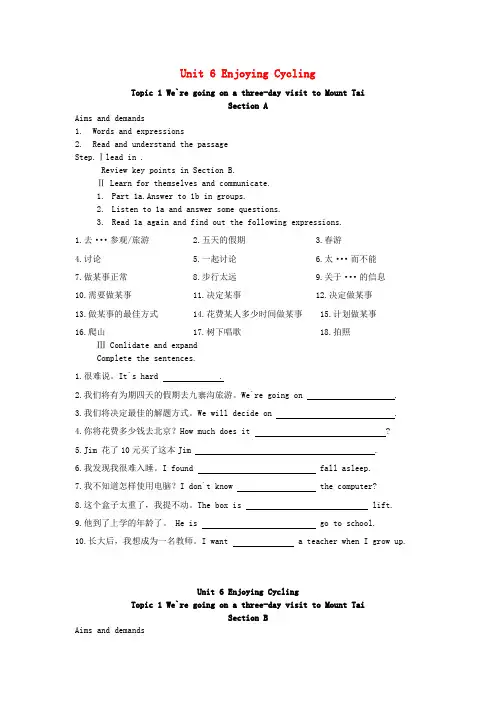
Unit 6 Enjoying CyclingTopic 1 We`re going on a three-day visit to Mount TaiSection AAims and demands1.Words and expressions2.Read and understand the passageStep.Ⅰlead in .Review key points in Section B.Ⅱ Learn for themselves and communicate.1.Part 1a.Answer to 1b in groups.2.Listen to 1a and answer some questions.3.Read 1a again and find out the following expressions.1.去···参观/旅游2.五天的假期3.春游4.讨论5.一起讨论6.太···而不能7.做某事正常 8.步行太远 9.关于···的信息10.需要做某事 11.决定某事 12.决定做某事13.做某事的最佳方式 14.花费某人多少时间做某事 15.计划做某事16.爬山 17.树下唱歌 18.拍照Ⅲ Conlidate and expandComplete the sentences.1.很难说。
It`s hard .2.我们将有为期四天的假期去九寨沟旅游。
We`re going on .3.我们将决定最佳的解题方式。
We will decide on .4.你将花费多少钱去北京?How much does it ?5.Jim 花了10元买了这本Jim .6.我发现我很难入睡。
I found fall asleep.7.我不知道怎样使用电脑?I don`t know the computer?8.这个盒子太重了,我提不动。
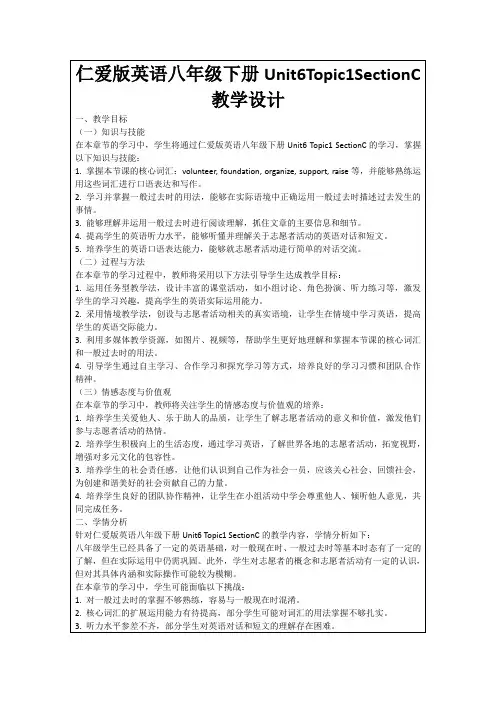
Unit6 Topic1 SectionB 参考教案Ⅰ.Material analysis本节课建议用1 课时学完。
主要活动为Section B 的1a 和2。
本课教学内容继续围绕旅游展开。
要求学生通过本课的学习活动掌握黑体单词和短语book tickets/rooms, pay, pay for…, hotel, fridge, standard, single, condition 和comfortable, 理解白体词汇sleeper 和air conditioning, 学会如何用英语预订车票、房间,如何询求和提供帮助,继续学习动词不定式的用法,同时教育学生要学会做好出行前的准备;培养学生热爱旅游、积极探索的态度。
Ⅱ.Teaching aimsKnowledge aims:1. 学生能正确掌握元音连读的技巧;拼读并运用黑体单词。
2. 学生能正确掌握pay, cost, spend 和take 表示花费时的不同用法。
3. 学生能自如地运用以下句式提供帮助:Can I help you? / What can I do for you?4. 学生能学会如何用英语预订车票、房间。
5. 学生能进一步掌握动词不定式的用法。
Skill aims:1. 能听懂有关预订车票、房间的短文或对话,并从中获取信息。
2. 能使用英语预订车票或房间等。
3. 能理解有关旅游、预订等方面的叙述,并从中获取需要的信息。
4. 能用英语制订旅游计划。
Emotional aims:1. 具有积极参与课堂上各种英语实践活动的兴趣。
2. 培养学生热爱旅游、积极探索的态度。
Ⅲ.The key points and difficult pointsKey points:1. 正确掌握元音连读的技巧。
2. 正确掌握pay, cost, spend 和take 表示花费时的不同用法。
3. 学会如何用英语预订车票、房间。
4. 初步掌握动词不定式的用法。
八年级仁爱英语Unit 6 Enjoying CyclingTopic 1 I have some exciting news to tell you. Section A一学习目标1.掌握Page27-28的单词,重点短语及句型2、语法:了解动词不定时to do 的几种基本用法。
二重难点预设1. 动词不定式2.cost ,spend ,take 表”花费”的区别三知识链接1. (参看P122的动词不定式)2. 1)Sb. spend + time/money + on sth. (某人花费[多少钱/多少时间]在某物上)Sb. spend + time/money + (in) doing sth. (某人花费…多用时间]来做某事)2)It takes sb. + time + to do sth. (做某事花费某人……[用时间])3)Sth. cost sb. + money. (某物花费某人……[多少钱])Sth. cost + money. (某物价值……[多少钱])我花10元买了本小说。
I _____________ 10 yuan on the book. I ______________ 10 yuan for the book.四自主学习一)预习教材27页 1a对话,当场画出下面并进行回答句型1 I have some exciting news to tell you. __________________句型 2 It will take us a few days to get there by bike. __________________句型 3 We feel disappointed because he was not able to buy a ticket. ___________二)SectionA 课堂教学单词之后从中找出下12个短语。
1. some news to tell you______2.spring field trip____3. go on a three-day visit___4. get t here______5.it will take sb. time. to do sth. ______6. make a decision____7. choose proper vehicles_________ 8.find out _________9. the cost for_________10. over the phone_________ 11.decide on sth. _________ 12.on our trip_______五问题合作探究step1.生听1a,完成1b部分step 2. 生listen to 1a 并模仿1c部分来询问别人的看法的句step3生齐读1a,画出含有不定式的六个句子step4生读1a,完成1d 部分step5.生看2的图画和句子,并加以诵读同时加以回答句型4 How much does it take to get there by …?回答__________________ 句型 5 How much does it take to get to Mount tai by…回答__________________句型 6 The best way to get there is by …because …回答__________________六成果展示巩固上面的12个短语和6个句型1.告诉你一些消息_________2.踏春 _________3.去玩三天_________4. 到那_________5.某人将花多长时间做某事_________ /_________6.做决定_________7. 选择合适的交通_________8.查找_________9.找出…的费用_________10. 通过电话_________11. 在某事上做事_________ 12. 在踏春_________1.我有好消息告诉大家。
Unit 6 Topic 1 We’re going on a three-day visit to Mount Tai.教学设计Section AⅠ. Material analysis本节课为该话题的第一节课,建议用1课时上完。
主要活动为1a和3。
本单元教学内容主要围绕旅游和交通方面的话题展开。
话题一主要让学生学习如何用英语谈论旅游,如何用英语预订车票、房间,如何为旅游筹集资金、制订出行计划等。
动词不定式是本话题的重点语法项目。
本课通过让学生掌握旅游地点、交通方式和所需费用等常识,掌握黑体单词和短语field, proper,total, go on a visit to … 和decide on…, 理解白体词汇mount, vehicle, airline, partner和suitable, 掌握动词不定式的用法,同时教育学生要学会制订计划;培养学生热爱旅游、积极探索的精神。
Ⅱ. Teaching aimsKnowledge aims:1. 学生能正确拼读并运用黑体单词。
2. 学生能正确运用以下短语造句:go on a visit to …, make a decision, too…to…和decide on…3. 学生能自如地运用以下句式进行交流:I have some exciting news to tell you.We’re going on a three-day visit to Mount Tai.It will take us a few days to get there by bike.It costs …Let’s decide.We’ll decide on the best way to travel on our field trip.4. 学生能简单地掌握动词不定式的用法。
◆Skill aims:1. 能听懂有关旅游的短文或对话,并从中获取信息。
2. 能使用英语与他人谈论关于旅游的话题。
Unit6 Topic1 SectionD 参考教案Ⅰ. Material analysis本节课建议用1 课时学完。
主要活动为Section D 的1a。
Section D 是一节复习课,在综合复习Sections A-C 的词汇、语法和功能句的基础上,巩固学生对本话题内容的学习。
学生将在1a 的阅读环节中,继续谈论旅游的话题,培养学生热爱旅游、积极探索的态度。
在培养学生阅读能力的同时,提高学生的写作能力。
Ⅱ. Teaching aimsKnowledge aims:1. 学生能正确拼读并运用黑体单词top。
2. 学生能正确运用动词不定式。
3. 学生能进一步谈论旅游的话题。
Skill aims:1. 能听懂有关旅游的短文或对话,从中获取信息。
2. 能理解有关旅游方面的叙述,并从中获取需要的信息。
3. 能用英语简单描述旅游的心得与感受。
Emotional aims:培养学生热爱旅游、积极探索的态度。
Ⅲ. The key points and difficult pointsKey points:1. 正确掌握本话题的功能句的用法。
2. 掌握动词不定式的用法。
Difficult points:1. 掌握动词不定式的用法。
2. 写出有关旅游方式、心得与感受的短文。
Ⅳ. Learning strategies1. 善于创设情景,在情景中提高语言交际能力,突显语言交际功能。
2. 善于分组活动,在小组中积极与他人协作,取长补短,共同完成学习任务。
Ⅴ. Teaching aidsComputer multimedia projector.1 / 7Ⅵ. Teaching proceduresStep InteractionpatternS tudent activity Teacheractivity1. The whole 1. Students focus 1. Greet the students and make class work. their them ready for learning.2. The whole attention on the 2. The teacher asks theclass work. teacher. students to report their2. Students report homework. Let the studentstheir report the passage theyhomework. finished about raisingmoney.3. The whole 3. The teacher leads theclass work. 3. Students play the students to play the game: game to What’s missing? Review thereview the words words and phrases of thisand topic. Introduce the newphrases of this word top.4. Group work. topic. 4. The teacher leads thestudents to read throughSections A-C and completethe Introduction 4. Students read sentences with the correct(8minutes) 5. The wholeclass work. through SectionsA-C, and finishthewords.5. The teacher asks thestudents totell the answers. grammar table.Stress theusages of infinitives.6. Group work.5. Students checkthe Finishthe grammar table.answers with the 6. The teacher asks theteacher. students to complete 7. The wholetheclass work.6. Studentscompletesentences with correct words.theFinish the functions function table.table.7. The teacher asks thestudents to check theanswers.7. Students tell theiranswers, and then check the answers with the teacher.2 / 71. The whole 1. Students read the 1. The teacher asks the studentsclass work. sentences of 1a, to read the sentences ofand 1a and grasp the generalgrasp the general ideas of them.2. The whole ideas of 2. The teacher asks theclass work. them. students to number the2. Students read the sentences.3. The whole sentences and 3. The teacher asks twoclass work. number students to tell theirthem in the right answers.4. The whole order. 4. The teacher asks the studentsclass work. 3. Students check to read the passage andtheir mark T or F.5. The whole answers with the 5. The teacher asks twoclass work. teacher. students to tell theanswers. Ask them topay 4. Students read it attentionto top and theagain top of…onPresentati(10minute 6. The wholeclass work.and mark T or F.5. Volunteers read6. The teacher asks thestudentsto read the passage)7. The wholeclass work.theanswers. Studentscheckthe answers withthefor thethird time and findout theinfinitive sentences.7. Teacher asks twostudentsto tell the answers.Let thestudents grasp theusageof infinitives.help of the teacher.6. Students read thepassage and findoutthe infinitivesentences.7. Volunteers reporttheanswers. Studentscheck the answerswith the teacher.3/ 71. The whole 1. Students read the 1. The teacher plays theclass work. passage recording sentence byafter the recording sentence.2. The whole sentence by 2. The teacher plays theclass work. sentence. recording without stopping.2. Students try tofollow the speed,3. Individual paying attention to 3. The teacher lets the studentswork. the pronunciation read 1a silently and find out theand intonation. key words.4.The whole 3. Students read 1a 4. The teacher asks two students toclass work. and report their key words.5. The whole find out the key 5. The teacher asks the students to class work. words. retell the passage according tothe key words.6. The whole 4. Students check the 6. The teacher asks the students toConsolidati on(10 minutes)class work.7. Twostudents’answers with theteacher.5. Students retellthepassageaccordingwrite a passage todescribe oneof their favorite trips.Finish 2.7. The teacher asks twostudents toto write down their passagesonthe blackboard.work. the key words. 8. The teacher checks the6. Students write passages.8. The whole theirclass work. own passages.7. Students writedowntheir passages onthe blackboard. 8.Students shouldpayattention to theusageof infinitives.4/ 71. The whole 1. Students make up 1. The teacher asks the students toclass work. similar make up similar sentences withsentences with infinitives.2. The whole infinitives. 2. The teacher asks the students to class work. show the sentences to the whole2. Students show the class.3. Gruop work. sentences to thewhole 3. The teacher asks the students tofind out more usefulclass.4. Individual work. 3. Students makeshortconversations andactthem out.expressions in thistopic ingroups, make shortconversations and actthem out.4. The teacher shows thefollowing sentences onthePracticescreen. Askthestudentstocompletethe4. Studentscompletesentences,using theright formsthesentences, usingtheof thegiven words.(10 minutes)right forms ofthe(1) I have someexcitingnews ____ you. (given words.tell)(2) It will take us afewdays ___ there bybike.(get)(3) The best way ___(raise)5. Students checktheanswers with theteacher.money is ___ (sell)newspapers.(4) I want ___ somephotos to you.(show)(5) Miss Wang told usnot5. The whole ___ our parents forthe money. (ask)(6) Why don’t we putona show ___ money? (raise)(7) Kangkang helped us___ the train tickets.(book)(8) I’m lookingforward___ from you.(hear)5. The teacher asks two class work. students to write down theiranswers on the blackboard.5/ 71. The whole 1. Students make a 1. The teacher organizes the class work survey in students to make a survey and groups. about “where your classmates group work. would like to travel” andwork out the total cost.Name place Totalcost2. Theteacher asksthestuden ts to work in2. The whole 2. Students work in groups and choose one of class work groups the most popular places for and and complete the you to travel. Let them group work. table. complete the table.3. The teacher asks thestudents to writedown the usefulphrases and3. The whole expressions.Production (7 minutes)class workandgroup work.3. Students writedownthe usefulphrases4. The teacher asks thestudents towrite down theirtraveland routes and schedules.5. The teacher asks the4. Individual expressions for students to read their work. their productions. Sum up thesurvey. passage.5. The wholeclass work.4. Students writedown6. The teacher showsthesummary to thetheir passages.students.7. The teacher assigns6. The whole 5. Students check the homework:class work. passages written (1) Review the summaryby after class.7. Individual themselves. (2) Write a letter to your work. friend and talk about the6. Students experience of your trip.summarize (3) Prepare for Section ASection D with the after class.teacher.7. Students finish thehomework afterclass.6/ 7Teaching The students can talk about traveling fluently after the learning ofReflectio this topic. They can grasp the usage of infinitives better now. The n teacher should design more exercises for them for consolidation. Ⅶ. Blackboard designUnit 6 Enjoying CyclingTopic 1 I have some exciting news to tell you.Section D1. It takes sb. some time to do sth.It costs sb. some money to do sth.2. look forward to doing sth.3. the top of …7 / 7。
Unit 6 Enjoying CyclingTopic 1 We’re going on a spring field trip.Section AⅠ. Aims and demands1. (1) Learn some new words and expressions about transportation:①vehicle, airplane, airline, raise, field, total②two-day, the best way to do sth., the cost to go by train, find out, decide on,,2. Learn the usage of infinitives. I have some exciting news to tell you! It’s hard to say. You two find out the cost to go by train.3. Talk about the topic about traveling.4. Expressing wishes: Have a good trip!Ⅱ. Teaching aids: multimedia and PPTⅣ.Teaching Procedures:Step1 Warming up & Lead in (5 minutes)T: How do you usually come to school? I usually go to school by bike. What about you? Ss: I usually go to school (by bike/ bus/car, on foot….)T: How long does it take to get here?Ss: About 10 minutes.T: You know these days are rainy. Because it is spring now. I have some exciting news to tell you, we will have a four-day spring field trip if the weather permitting. (Present “field, spring field trip”)But first we will find out the cost, in order to decide on the best way to get there. Miss Wang’s class is discussing on their two-day visit to Mount Tai.(Present “cycle, too…to…vehicle, airplane”)Step2 Presentation (8 minutes)T: They don’t know which the b est way to get Mount Tai is. I think we should give them some help, do you think so? As we all know, the airplane is fast but expensive. The bus is cheaper but takes too long. And it is too far to cycle. So which is the best way? It’s hard to say. Then fir st, let’s listen to their discussion. Your task is to answer these questions.1. Where will they go? Mount Tai.2. What will Kangkang and Michael do? They will find out the cost by train.3. What will Helen do? She will find out the cost by bus.4. How about Jane? She will ask the airline over the phone.Step3 Consolidation (15 minutes)T: Now read the dialogue after me and pay attention to the pronunciation,please find some sentences with “to do”. Read the sentences together.T: Let’s practice “to do”. Do 3 pair work together. Then another exercise for you.1. I’d like something___________(eat).2. Our task is___________(find out)the place.3. It’s hard___________(say).4. The best way___________(go) is by airplane.5. He asks me____________(come back)on time.6. It’s important_________(study)English well.7. It takes me much time__________(do)my homework every day.Step5 Practice(12 minutes)Now it’s time to help Miss Wang’s class to decide on the best way to go on their field trip. You have several minutes to discuss and choose the best way to travel according the information.A: How much does it cost to go there by …B: It costs …A: How long does it take to reach Mount Tai by …B: It takes …The best way to get there is by…At the beginning, I’ve said that we will go on a four-day spring field trip. We have three places to choose. (Present the pictures)T: Please look at the picture. What can you see in the picture?Ss: The ice lantern.T: I’ve been to Harbin last winter. And I’ve seen the red maple in Xiangshan last autumn. They are so beautiful. I will never forget the scenery .The last one is Jiuzhaigou , I’ve never been there before. I am dreamed of traveling there. I have got some information about them. Now discuss with your partner, we will decide on the best place to travel. Step6 Homework(5 minutes)Write a passage about traveling including: Where do you want to go? How would you like to get there? How much does it cost to go there?. How long does it take to go there? What is the best time to go there?Blackboard DesignNew words Useful expressionsairplane: plane n. go on a visit tofield n. decide on/upon sth.task: find out: decide on :two-day go on a visit to::too…to:the best way to do sthUnit 6 Enjoying CyclingTopic 1 We’re going on a spring field trip.Section A作业设计一、Filling banks1. I’d like something___________(eat).2. Our task is___________(find out)the place.3. It’s hard___________(say).4. The best way___________(go) is by airplane.5. He asks me____________(come back)on time.6. It’s important_________(study)English well.7. It takes me much time__________(do)my homework every day.二、Multiple choice1. I have lots of homework __________.A. doB. to do Ceding D. will do2. We have a _____ holiday.A. three-dayB.three-days 1.I have lots of homework __________.A.doB. to doC.doingD.will do2. We have a _____ holiday.A. three-dayB. three-daysC. three dayD. three days3. It’s too heavy for ______ _______ carry.A. me; toB. me; /C. I; toD. me; too4. We’ll go on _____ the Great Wall.A. visitB. a visitC. a visit toD. visiting5. You can _______ the bus station _______ the phone.A. ask; toB. answer; forC. answer; toD. ask; over6. Let’s decide _______ the best way to go on out visit to Hainan.A. inB. atC. onD. for三、WritingWrite a passage about traveling including: Where do you want to go? How would you like to get there? How much does it cost to go there?. How long does it take to go there? What is the best time to go there?。
石角中学2012年春八年级下英语教学案编写人:令狐克敏课时:5Unit6 Topic1 学案课型:新授课时:5 授课时间:2012 年3 月1-6 日执笔人:令狐克敏检查人:初二英语备课组审核人:课时1 SectionA学习目标:1、学习有关交通方面的新单词和表达。
2.学习动词不定式“to do ”的用法。
3.讨论关于旅游的话题。
学习过程:一.读1a, 回答问题1. What are they going to do for their spring field trip?___________________________________2. How would Jane like to go there?__________________________________________________ 二.在文中找到,划出并背诵下面的短语1. 有些激动人心的消息要告诉你们8.在电话中_________________________ ____________________________________ 9.决定,选定_______________________2. 进行一次两天的旅游______________________ 10. 进行春游的最佳方式_____________3. 做决定____________________________________11.计划做某事______________________4. 到那的最佳方式____________________________12.关于它的一些事__________________5. 很难说____________________________________13.不客气__________________________6. 找出,发现,查明__________________________14. 看日出_________________________7. 乘火车去的费用_________________________ 15. 筹钱___________________________16 旅途愉快_______________________ 三.在文中划出下面的句子并翻译1. I have some exciting news to tell you! 译:__________________________________________点拨:to有两种用法:1)动词不定式的标志,后加动词原形;2)介词,“到”在此句中动词不定式to tell you作名词news的______语。
练习:1). I have a lot of homework______________ (do).2). Do you have anything important _________ say?3). 我没有谈得来的朋友. ___________________________________________4). 没什么可担心的. ____________________________________________5). 有其他的交通工具可选。
_______________________________________________ 2.. We are going on a two-day visit to Mount Tai.译:______________________________________________点拨:two-day是复合形容词,作定语修饰名词visit. 类似的用法有a four-year-old boy ; a two-day holiday注意区分复合形容词two-day与名词短语two days. 复合形容词two-day, two-month, four-year-old 等只能作定语修饰名词。
练习:1). He is only ____ ___________ ______(三岁的男孩). Don’t be too strict with him.2). How lovely the baby is! It is only _______ _________ _______(三个月大).1石角中学2012年春八年级下英语教学案编写人:令狐克敏课时:53). You keep me waiting for _______ ________(五个小时)4).There is a _________________________(10米宽的) river in front of the village.5). I saw an _____________________ _____ (8岁的女孩) sitting on the grass.3. It will take us a few days to get there by bike. 译:____________________________________点拨: 此句中it是_________主语。
真正主语是________________________.请记住句型It takes sb.some time to do sth. 做某事花费某人多长时间练习:1).昨天做作业花了我两个小时。
It _______ ______ two hours ______ _______my homework yesterday.2). Jerry 将花费十天读完着本书。
It _______ _______Jerry ten days ______ _______ _______ the book.链接:somebody+ spend some time doing sth 某人做某事花多长时间1).昨天做作业花了我两个小时。
I _________ two hours ___________ my homework yesterday.2). Jerry 将花费十天读完着本书。
Jerry _______ _________ ten days __________ _________ the book.4.Let’s make the decision together. 译:__________________________________________回忆:decide 是_____ 词,决定做某事decide __________________. decide on sth decide 的名词形式_________________,相关词组:make a decision译:做出重要的决定__________________________________做出好的决定___________________________________5.It’s too far to cycle. 译:________________________________________点拨:1.)Ann太小了,不会读书。
Ann is ____________ ___________ __________ ___________books.2.) 我们昨天兴奋得睡不着。
We were ________ ________ __________ ___________ asleep yesterday.链接:so---that 译:_________________________1.)Ann太小了,不会读书。
Ann is _________ young _________she __________ read books.2.) 我们昨天兴奋得睡不着。
We were _____ _________ _______we ________ __________ asleep yesterday.注明:此句有争议。
有些老师认为此句为不定式短语做形式主语,调整后为:To cycle is too far.又有同事认为cycle不具备far的特征,应为too---to 结构。
it 指距离。
6. Let’s find out some information about the cost.译:____________________________________点拨: 区分find与find out:1)find 找到,发现,有偶然发现某物的意味。
例如:He found a wallet lying on the ground. 2)find out 找到,发现,查明,多指通过调查询问研究之后“搞清楚,弄明白”。
例如:Please find out who took my book by mistake. 译:___________________________________练习: 用find, find out 填空并翻译:1)I looked for my keys everywhere, but I couldn’t ________ them.2石角中学2012年春八年级下英语教学案编写人:令狐克敏课时:5 译:______________________________________________________________________2) He wants to _______ ______ the truth about what happened.译:______________________________________________________________________7. Helen, your task is to find out the cost by bus.译:_________________________________________________点拨:此处的to find out the cost by bus 在句中作_______语。
例:I think the most exciting way is to sell flowers in the evening.译:_____________________________我的工作是每天打扫教室。
My work is ___ __ ________ _______ ____________ every day.课时2四.语法重点动词不定式(请大家先认真预习课本123页动词不定式的语法部分)1. 作主语动词不定式作主语时,常用it作形式主语,而将真正的主语放到句末。